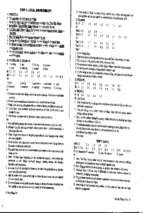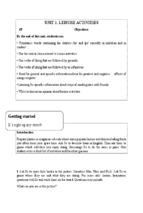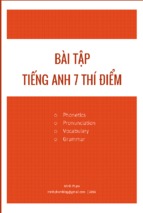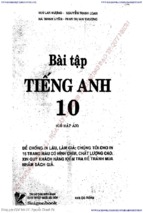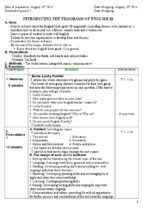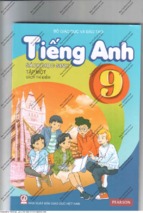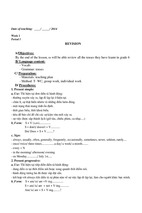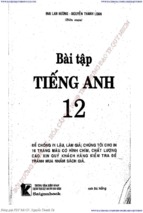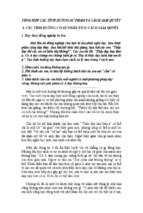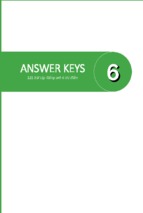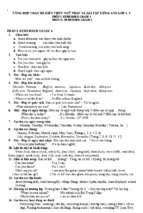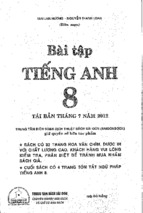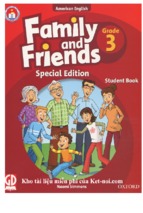ADVERBIAL CLAUSES ( EXERCISE )
ADVERBIAL CLAUSES OF RESULT
I. Mark the letter A, B, C or D to indicate the correct option to fill each of the following blanks.
1. Our seats were _____ far from the stage that we couldn't see the actors and actresses clearly.
A. very
B. too
C. enough
D. so
2. He was _____ he never washed his clothes by himself.
A. too lazy
B. so lazy that C. very lazy that
D. such lazy that
3. They are _____ young _____ drive the car.
A. so / that
B. too / to
C. enough / to D. not only / but also
4. It was _____ a boring speech that I felt asleep.
A. such
B. so
C. very
D. too
5. Is there _____ for everyone?
A. food and drink enough
B. enough food and drink
C. enough of food and drink
D. enough food and drink enough
6. He was _____ he could not continue to work.
A. very tired that
B. such tired that
C. too tired that
D. so tired that
7. John’s eyes were _____ bad that he couldn’t read the number plate of the car in front.
A. such
B. too
C. so
D. very
8. - Why don’t we make a fire? - It’s not cold _____ to make a fire.
A. too
B. enough
C. such
D. much
9. Most of the pupils are _____ to pass the examination.
A. enough good
B. good enough
C. too good
D. very good
10. You can send me a letter if you want to, but your phone call is _____ for me.
A. enough good
B. good as enough
C. good enough
D. good than enough
11. Davis has _____ many patients _____ he is always busy.
A. too / that
B. very / until C. such / that
D. so / that
12. It was _____ a difficult question that they couldn't explain.
A. so
B. such
C. very
D. too
13. The lesson _____ for me to understand.
A. is very difficult
B. too difficult C. difficult too D. is too difficult
14. The tent show is _____ for us to see.
T à i l i ệ u s ư u t ầ m , t ổ n g h ợ p P a g e 1 | 13
ADVERBIAL CLAUSES ( EXERCISE )
A. enough interesting
B. very interesting
C. interesting enough
D. interesting
15. They are _____ that they can't buy a bicycle.
A. enough poor
B. poor enough
C. so poor
D. too poor
II. Mark the letter A, B, C or D to show the underlined part that needs correction.
1. These televisions are all too expensive for we to buy at this time.
A
B
C
D
2. Mi has such many things to do that she has no time to go out.
A
B
C
D
3. My brother is too young not to do volunteer work .
A
B
C
D
4. These televisions were so expensive for us to buy at that time.
A
B
C
D
5. That is such an interested story that everybody would like to read it.
A
B
C
D
6. The road is very slippery for us to drive fast.
A
B
C
D
7. The woman was so surprised that she couldn’t say nothing.
A
B
C
D
8. She had so many luggage that there was not enough room in the car for it.
A
B
C
D
9. He had so a difficult exercise that he couldn't do it.
A B
C
D
10. John had so interesting and creative plans that everyone wanted to work with him.
A
B
C
D
III. Mark the letter A, B, C or D to indicate the sentence which is closest in meaning to the given
one
1. We couldn’t go out because the weather was so bad.
A. It was so bad a weather that we couldn’t go out.
B. It was such a bad weather that we couldn’t go out.
T à i l i ệ u s ư u t ầ m , t ổ n g h ợ p P a g e 2 | 13
ADVERBIAL CLAUSES ( EXERCISE )
C. It was so bad weather that we couldn’t go out.
D. It was such bad weather that we couldn’t go out.
2. She was so busy that she couldn’t answer the phone.
A. She was very busy that she couldn’t answer the phone.
B. She was too busy to answer the phone.
C. She was too busy not to answer the phone.
D. She was very busy so that she couldn’t answer the phone
3. The coffee was too hot for me to drink.
A. The coffee is so hot that I can’t drink it
B. The coffee is so hot that I can’t drink.
C. The coffee was so hot that I couldn’t drink it.
D. The coffee was so hot that I could drink it.
4. If I were taller, I could reach the top shelf.
A. I am not tall enough to reach the top shelf.
B. I am too tall to reach the top shelf.
C. I cannot reach the top shelf because I am very tall.
D. In spite of being tall, I cannot reach the top shelf.
5. It was such a boring speech that we began to yawn.
A. The speech was very boring that we began to yawn.
B. It was so a boring speech that we began to yawn.
C. The speech was too boring that we began to yawn.
D. The speech was so boring that we began to yawn.
6. It was so late that nothing could be done.
A. It was too late for nothing to be done.
B. It was too late for anything to be done.
C. It was such late that nothing could be done.
D. It was so late that nothing to be done.
7. This is the first time I have lived in such a friendly neighborhood.
A. I have lived in such a friendly neighborhood before.
B. I haven’t lived in such a friendly neighborhood before.
C. I had lived in such a friendly neighborhood before.
D. I hadn’t lived in such a friendly neighborhood before.
T à i l i ệ u s ư u t ầ m , t ổ n g h ợ p P a g e 3 | 13
ADVERBIAL CLAUSES ( EXERCISE )
8
The test was so difficult that we couldn’t finish it in two hours.
A. It was such a difficult test that we couldn’t finish it in two hours.
B. The test was too difficult for us to finish it in two hours.
C. The test was not difficult enough for us to finish in two hours.
D. The test was too difficult for us to finish it in two hour.
9. The book was so good that I couldn’t put it down.
A. It was so a good book that I couldn’t put it down.
B. It was such a good book that I couldn’t put it down.
C. The book was so good for me to put it down.
D. The book was so good that I couldn’t put down.
10. Sue is too slow to understand what you might say.
A. Sue is not enough quick to understand what you might say.
B. What you might say, Sue can understand slowly.
C. Sue is so slow to understand what you might say.
D. So slow is Sue that she can’t understand what you might say.
IV. Sentence transformation
1. The boy can’t wear the shirt because it’s very tight.
The shirt is so…………………………………….
The shirt is too…………………………………….
2. This problem is very difficult. He can’t solve it.
The problem is too……………………………
It is such ……………………………………..
3. The man was not able to go on an expedition to the Middle East because of his age.
The man was too ……………………………………………………………
4. Hoa is very sick. She can’t sit up.
Hoa is so……………………….
5. It was very dark, so she couldn’t go out.
It was too…………………………….
6. That car was too old for me to buy.
That car was so……………………
7. The movie was so funny that we couldn’t stop laughing.
It was such……………………………………………
T à i l i ệ u s ư u t ầ m , t ổ n g h ợ p P a g e 4 | 13
ADVERBIAL CLAUSES ( EXERCISE )
8. No one could move the piano. It was very heavy.
The piano was too ……………………………..
9. We shouldn’t swim in this river. The water isn’t clean.
This river isn’t ………………………………………..
10. John couldn’t get to sleep last night. He was worried about exam.
John was so………………………………………………………..
11. It was a good book. I couldn’t put it down.
It was such………………………………………………………..
12. They were beautiful flowers. We took a photograph of them.
They were……………………………………………………
13. She speaks English well. You would think it was her native language.
She speaks……………………………………………………………..
14. A taxi would have been best. But I didn’t have enough money.
I didn’t have………………………………………………….
15. All my guests will need chairs. But I haven’t got very many.
I didn’t have………………………………………………….
ADVERBIAL CLAUSES OF TIME
1. I will call you before I ________ over.
A. come
B. will come
C. will be coming
D. came
C. had got
D. get
2. After she graduates, she ________ a job.
A. got
B. will get
3. When I _________ him tomorrow, I will ask him.
A. saw
B. have seen
C. will see
D. see
4. As soon as it _________ raining, we will leave.
A. stops
B. stop
C. had stopped
D. stopped
5. By the time he comes, we will have already __________.
A. leave
B. leaving
C. left
D. leaves
C. will have seen
D. saw
6. Whenever I ________ her, I say hello.
A. see
B. will see
T à i l i ệ u s ư u t ầ m , t ổ n g h ợ p P a g e 5 | 13
ADVERBIAL CLAUSES ( EXERCISE )
7. The next time I go to New York, I am going ________ a ballet.
A. seeing
B. see
C. saw
D. to see
8. I will never speak to him again so long as I _______.
A. lives
B. will live
C. am living
D. live
9. By the time Bill ____ to bed tomorrow, he will have had a full day and will be ready for sleep.
A. had gone
B. will go
C. goes
D. went
10. As soon as I finish my report, I will call you and we ________ out for dinner.
A. went
B. will go
C. will have gone
D. go
11. By the time I return to my country, I _________ away from home for more than three years.
A. would be
B. will have been
C. will be
D. am
12. After he _______ breakfast tomorrow, he will get ready to go to work.
A. will have had
B. has
C. will be having
D. have
13. As soon as he finishes dinner, he _______ the children for a work to a nearby playground.
A. will take
B. takes
C. will be taking
D. took
14. When Bill gets home, his children ___________ in the yard.
A. played
B. will play
C. will be playing
D. play
15. He will work at his desk until he ______ to another meeting in the middle of the afternoon.
A. went
B. go
C. will go
D. goes
16. She ________ lunch by the time we arrived.
A. finished
B. has finished C. had finished
D. finishing
17. Bob will come soon. When Bob _______, we will see him.
A. come
B. will come
C. will be coming
D. comes
18. I will get home at 5:30. After I get home, I ________ dinner.
A. will have
B. will be having
C. had
D. have
19. As soon as the taxi _________, we will be able to leave for the airport.
A. arrives
B. arrive
C. will arrive
D. arrived
C. will finish
D. finishes
C. could be
D. will be
20. I will go to bed after I _________my work.
A. finish
B. finished
21. I ________ here when you arrive tomorrow.
A. am
B. had been
22. I am going to wait right here until Jessica ________.
A. comes
B. will have come
C. is coming
D. came
T à i l i ệ u s ư u t ầ m , t ổ n g h ợ p P a g e 6 | 13
ADVERBIAL CLAUSES ( EXERCISE )
23. As soon as the war ________over, there will be great joy throughout the land.
A. are
B. will be
C. is
D. would be
24. Right now the tide is low, but when the tide comes in, the ship ______ the harbor.
A. left
B. will leave
C. will have left
D. leave
25. I am going to start making dinner before my wife ______ home from work today.
A. get
B. gets
C. will get
D. got
Identify the underlined part that needs correction :
26. When it raining, I usually go to school by bus.
A
B
C
D
27. I learned a lot of Japanese while I am in Tokyo.
A
B
C
D
28. I have not been well since I return home.
A
B
C
D
29. I’ll stay here until will you get back.
A
B
C
D
30. When Sam was in New York, he stays with his cousins.
A
B C
D
31. Last night, I had gone to bed after I had finished my homework.
A
B
C
D
32. I will call you before I will come over.
A
B
C
D
33. Ever since I was a child, I had been afraid of dogs.
A
B
C
D
34. By the time I left my apartment this morning, someone looked for me.
A
B
C
D
35. Whenever Mark will be angry, his nose gets red.
A
B
C
D
36. I had fried chicken when I am at the restaurant.
A
B
C
D
37. The first time that I went to New York, I go to an opera.
A
B
C
D
T à i l i ệ u s ư u t ầ m , t ổ n g h ợ p P a g e 7 | 13
ADVERBIAL CLAUSES ( EXERCISE )
38. Before I arrived, he was talking on the phone.
A
B
C
D
39. When she will see him tomorrow, she will ask him.
A
B
C
D
40. As I was walking home, it begin to rain.
A
B
C
D
41. We stayed there after we finished our work.
A
B
C
D
42. Once it will stop raining, we will leave.
A
B
C
D
43. I will never speak to him again as long as I will live.
A
B
C
D
44. As soon as the other passengers gets on the bus, we’ll leave.
A
B
C
D
45. As soon as I will finish my report, I’ll call you and we’ll go out to dinner.
A
B
C
D
46. Mark was listening to music after his sister was reading a book.
A
B
C
D
47. Sam hadn’t received the parcel when I speak to him.
A
B
C
D
48. I have been hoping to meet you before I read your first novel.
A
B
C
D
49. By the time you finishes getting ready, we will have missed the train.
A
B
C
D
50. When you will arrive, there will be someone to meet.
A
B
C
D
ADVERBIAL CLAUSES OF REASON
I/ Choose the best answer among A, B, C or D to complete each sentence.
T à i l i ệ u s ư u t ầ m , t ổ n g h ợ p P a g e 8 | 13
ADVERBIAL CLAUSES ( EXERCISE )
he is tired, he can’t work longer.
1.
A. Because
2.
B. Even though
C. Although
D. Besides
it was so cold, he went out without an overcoat.
A. If
3.
B. Since
C. Although
D. Because
it was late, we decided to take a taxi home.
A. Because
4.
B. Since
C. Because of D. Although
you subtract 7 from 12, you will have 5.
A. Because
B. If
C. Though
5. We couldn’t reach the house
A. because
6.
D. As
the road was flooded.
B. because of
C. if
D. though
he has a headache, he has to take an aspirin.
A. Because
B. Because of C. Although
7. The flight had to be delayed
A. because
8.
D. In spite of
the bad weather.
B. Because of C. despite
D. when
he comes to the theater with me, I shall go alone.
A. Because of
B. Because
9. Take a map with you
A. so
10.
C. Unless
D. When
you lose your way.
B. because
C. although
D. in case
rain or snow, there are always more than fifty thousand fans at the football
games.
A. Even though
11.
B. Because
C. Despite
D. Because of
his illness, he had to cancel the appointment.
A. However
B. Despite
C. If
12. Minh had a terrible headache.
A. However
A. but
, he went to school.
B. But
13. Tom has a bike,
C. Although
B. because of
C. because
B. so that
B. because
D. despite
she dislikes flying.
C. although
15. We decided to leave the party early
A. due to
D. Because
he always walks to school.
14. My sister will take the plane
A. because
D. Because of
D. before
it was boring.
C. but
D. and
T à i l i ệ u s ư u t ầ m , t ổ n g h ợ p P a g e 9 | 13
ADVERBIAL CLAUSES ( EXERCISE )
16. The students arrived late
A. because
17.
the traffic jam.
B. owing to
C. despite
D. so
he missed the first bus, he came ten minutes late.
A. Since
18.
B. Although
C. However
D. Therefore
his physical handicap, he has become a successful businessman.
A. In spite of
B. Because of C. If
D. Although
19. It was difficult to deliver the letter
the sender had written the wrong
address on the envelope.
A. though
20.
B. but
C. so
D. because
it rained heavily, I went to school on time.
A. However
B. But
C. Although
D. Because
21. He didn’t answer the questions correctly _______.
A. although he isn’t intelligent
B. because he is intelligent
C. in spite of his intelligence
D. despite his intelligent
22. ______, I can’t hear what he is saying.
A. Because of the noise
B. Because of the soft music
C. Though the music is noise
D. In spite of the noise music
23. _____, I feel very refresh.
A. Because I work very hard
B. Although I get up early
C. Because of getting up early
D. Despite getting up late
24. They live happily ______.
A. because they have no money
B. though they are rich
C. in spite of their poverty
D. because of their poor
25. He can’t join in the volunteer campaign _______.
A. although he is busy
B. because he hurts his legs
C. in spite of working very hard
D. because of registering for it
26. Though he drove carefully, he had an accident yesterday.
A. Despite his carelessness, he had an accident yesterday.
B. Despite he drove carefully, he had an accident yesterday.
C. In spite of driving carefully, he had an accident yesterday.
D. In spite of a careful drive, he had an accident yesterday.
27. He was very tired but he kept on working.
T à i l i ệ u s ư u t ầ m , t ổ n g h ợ p P a g e 10 | 13
ADVERBIAL CLAUSES ( EXERCISE )
A. Despite very tired, he kept on working.
B. Though his tiredness, he kept on working.
C. Although he was very tired, but he kept on working.
D. He kept on working although he was very tired.
28. Although it rained heavily, they went on working.
A. In spite of the rain heavily, they went on working.
B. In spite of the raining heavily, they went on working.
C. Despite the heavy rain, they went on working.
D. Though the fact that it rained heavily, they went on working.
29. Cars cause pollution but people still want them.
A. Because cars cause pollution, people want them.
B. Despite the fact that cars cause pollution, people want them.
C. Cars cause pollution although people want them.
D. Cars cause pollution because people still want them.
30. She was seriously ill but she enjoyed life very much.
A. In spite of her serious illness, she enjoyed life very much.
B. Although she enjoyed life very much, she was seriously ill.
C. She was seriously ill because she enjoyed life very much.
D. Despite seriously ill, she enjoyed life very much.
II/ Choose the underlined part among A, B, C, or D that needs correcting:
31. My friends advised her to stop doing the housework because her old age.
A
B
C
D
32. Because the invention of machines such as vacuum cleaners, washing machines,
A
B
women spend less time doing the housework.
C
D
33. John didn’t go to work because of he was seriously ill.
A
B
C
D
34. In spite of my father is old, he still goes to work.
A
B
C
D
35. Peter succeeded in his exam because of he worked hard and methodically.
T à i l i ệ u s ư u t ầ m , t ổ n g h ợ p P a g e 11 | 13
ADVERBIAL CLAUSES ( EXERCISE )
A
B
C
D
36. Rice plants grow well because the climate is warmly and damp.
A
B
C
D
37. The plane couldn’t take off because the bad weather.
A
B
C
D
38. He couldn’t drive fast owing to the street was crowded and narrow.
A
B
C
D
39. The train was late because the fog is thick.
A
B
C
D
40. Since the difficult test, I couldn’t finish it on time.
A
B
C
D
III/ Rewrite these sentences
1. He was late for school because his bike was broken.
……………………………………….because of …………………………………
2. Although he runs very fast, he isn’t tired.
Despite …………………………………………………………………………….
3. Most people think jogging is a good exercise, so they begin to jog.
Because .....................................................................................................................
4. The air in the country is polluted, but people like to live there.
.......................................................... though .............................................................
5. Computers can be used for various purposes, so they become very popular today.
Because of ................................................................................................................
6. If you passed the exam, your parents would be very happy.
……………………………………….. because ……………………………………
7. Because of the hot weather, we go to the beach.
If ……………………………………………………………………………………
8. Tom understands the lesson. However, he couldn’t apply in the exercises.
………………………………….. although ………………………………………..
9. They played very well. Therefore, they won the game.
Because ……………………………………………………………………………
10. The suitcase is too heavy for Tom to bring.
T à i l i ệ u s ư u t ầ m , t ổ n g h ợ p P a g e 12 | 13
ADVERBIAL CLAUSES ( EXERCISE )
………………………………………. because ………………………………….
T à i l i ệ u s ư u t ầ m , t ổ n g h ợ p P a g e 13 | 13
- Xem thêm -

